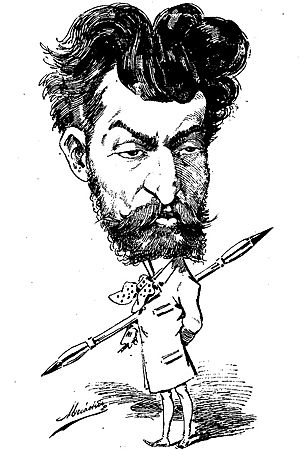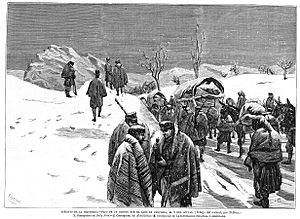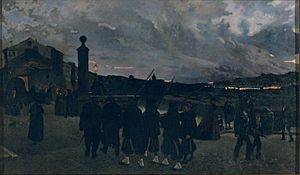Josep Lluís Pellicer facts for kids
Quick facts for kids
Josep Lluís Pellicer
|
|
|---|---|

Caricature by Eduardo Sáenz Hermúa, from Madrid Cómico, 1884
|
|
| Born |
Josep Lluís Pellicer i Fenyé
12 May 1842 Barcelona, Catalonia, Spain
|
| Died | 15 June 1901 (aged 59) Barcelona, Catalonia, Spain
|
| Nationality | Spanish |
| Education | Ramón Martí Alsina |
| Known for | Painter, sketcher, illustrator, caricaturist |
Josep Lluís Pellicer i Fenyé (born May 12, 1842 – died June 15, 1901) was a talented Spanish artist. He was a painter, an illustrator, and a cartoonist. He was known for his detailed drawings and his work as a war correspondent.
Contents
A Young Artist's Journey
Josep Lluís Pellicer was born in Barcelona, Spain. At first, he studied to become a surveyor. A surveyor is someone who measures and maps land. But he soon changed his mind. He decided to study art instead. His art teacher was Ramón Martí Alsina, who later became his father-in-law.
In 1865, Pellicer traveled to Rome, Italy. He went there to finish his art studies. While painting, he also drew pictures for newspapers. These included political cartoons. He often signed these cartoons with his pen name, "Nyapus." A pen name is a fake name an author or artist uses.
Art and Public Life
Pellicer supported ideas that favored a republic. A republic is a type of government. In a republic, people elect their leaders. In 1869, his art studio became a meeting place. Important people from the International Workingmen's Association met there. This group worked to improve conditions for workers. Pellicer's cousin, Rafael Farga i Pellicer, helped arrange these meetings.
That same year, Pellicer was chosen as a City Councillor for Barcelona. This means he was like a local government official. He also signed the Tortosa Pact. This was an agreement made by people who supported a republic in Spain.
Reporting from the Front Lines
Josep Lluís Pellicer also drew pictures about the Third Carlist War. This was a civil war in Spain. He also worked as a correspondent during the Russo-Turkish War (1877–78). A correspondent reports news from a faraway place. He sent his drawings to famous newspapers. These included La Ilustración Española y Americana, L'Illustration, and The Graphic.
His drawings were very detailed. He often drew them right on the battlefield. Sometimes he was even on the front lines of the war. He also worked for other magazines. These included Le Monde Illustré and L'Esquella de la Torratxa.
Artistic Achievements and Leadership
As a painter, Pellicer won awards. He received medals while studying in Rome. He also won a medal at an art show in Madrid in 1871. There, he showed his most famous painting. It was called "Zitto, Silencio...que pasa la ronda." This means "Shut Up! Silence! The Patrol is Passing!"
Pellicer helped organize the 1888 Barcelona Universal Exposition. This was a big international fair. After the fair, he became the director of a new museum. It was called the "Museo de Reproducciones."
He also helped start a group for illustrators. It was called the "Institut Català de les Arts del Llibre." He was the president of this group twice. Pellicer wrote articles about art for several newspapers. These included La Vanguardia, La Renaixensa, and the Diari Català. He also worked as an art director. He illustrated famous books like Don Quixote. He also illustrated The Legend of the Cid by José Zorrilla. And he worked on some of the Episodios Nacionales by Benito Pérez Galdós.
Pellicer was the president of the Reial Cercle Artístic de Barcelona three times. In 1894, he became a professor. He taught at the Reial Acadèmia Catalana de Belles Arts de Sant Jordi. This academy is now part of the University of Barcelona. Josep Lluís Pellicer passed away in Barcelona.
See also
 In Spanish: José Luis Pellicer para niños
In Spanish: José Luis Pellicer para niños
 | Bessie Coleman |
 | Spann Watson |
 | Jill E. Brown |
 | Sherman W. White |



